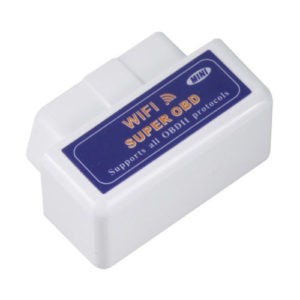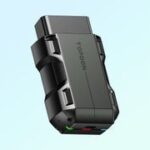Connecting your iPhone or iPad to your car’s onboard diagnostics (OBD2) port opens a world of information about your vehicle’s health and performance. But choosing the right Ios Obd2 Dongle can be tricky. This guide will help you understand the different types of iOS OBD2 dongles available and recommend some of the best options on the market.
Understanding iOS OBD2 Dongle Compatibility
Apple devices, including iPhones and iPads, have specific compatibility requirements when it comes to Bluetooth connections. This is crucial when selecting an OBD2 dongle. iOS supports the following connection types for OBD2 adapters:
- Bluetooth Low Energy (BLE) 4.0 and above: This is the recommended connection type for iOS devices due to its ease of use, low power consumption, and wide availability. Most modern OBD2 dongles use BLE.
- Wi-Fi: While Wi-Fi adapters work with iOS, they can be less reliable and may disrupt your phone’s internet connection. They often require a separate Wi-Fi network setup, which can be inconvenient.
- Bluetooth MFi (Made for iPhone/iPad): These adapters use classic Bluetooth but are specifically certified by Apple. This ensures seamless integration with iOS. While offering top-notch performance, MFi adapters are generally more expensive. OBDLink MX+ and vLinker FS are two popular examples.
Important Note: iOS does not support classic Bluetooth (versions 1.x, 2.x, 3.x) for OBD2 adapters due to operating system limitations. Avoid purchasing adapters with only classic Bluetooth, as they won’t work with your iPhone or iPad.
Recommended iOS OBD2 Dongles
Several excellent iOS OBD2 dongles are available, offering varying features and price points. Here are some top recommendations:
-
OBDLink MX+ (Bluetooth MFi): This premium adapter offers unparalleled performance and compatibility with iOS. It boasts a fast data transfer rate, reliable connection, and extensive vehicle coverage.
-
OBDLink CX (Bluetooth LE): A more affordable option from OBDLink, the CX provides excellent performance using Bluetooth LE. It features a large memory buffer and reliable data transfer.
-
vLinker MC+ (Bluetooth LE): This dongle strikes a good balance between price and performance. It uses Bluetooth LE for seamless iOS connectivity and offers reliable data transmission.
-
vLinker FS (Bluetooth MFi): Similar to the OBDLink MX+, the vLinker FS is an MFi-certified adapter offering a premium experience for iOS users.
-
Vgate iCar Pro 2S (Bluetooth LE & 2.0): This versatile adapter supports both Bluetooth LE and Bluetooth 2.0, making it compatible with a wider range of devices including iOS and Android. It’s a good option if you need to use the dongle with multiple operating systems.
iOS OBD2 Dongles to Avoid
When shopping for an iOS OBD2 dongle, be wary of adapters with the following characteristics:
- “Mini” in the name: These adapters often indicate poor quality and unreliable performance.
- Wired connections (USB, COM): iOS devices generally don’t support wired OBD2 adapters. Stick to wireless options.
- Extremely low prices: While affordability is important, suspiciously cheap adapters often indicate inferior components and potential connectivity issues.
- Specific Brands: Certain brands, such as xTool, KONNWEI, “Micro Mechanic,” “THINMI.COM,” and “KUULAA,” have been reported to have compatibility or performance issues with iOS devices.
Choosing the Right iOS OBD2 Dongle
Selecting the best iOS OBD2 dongle depends on your individual needs and budget. If you prioritize seamless compatibility and top-tier performance, an MFi-certified adapter like the OBDLink MX+ or vLinker FS is a great choice. For a balance of price and performance, consider a Bluetooth LE option like the OBDLink CX or vLinker MC+.
Remember to always verify compatibility with your specific iOS device and car model before purchasing. By choosing the right iOS OBD2 dongle, you can unlock valuable insights into your vehicle’s performance and keep it running smoothly.


